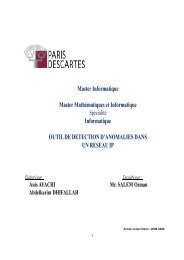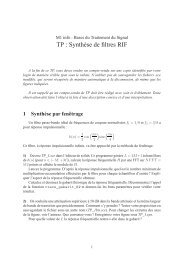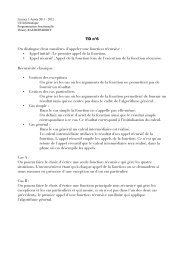Th`ese de Doctorat de l'université Paris VI Pierre et Marie Curie Mlle ...
Th`ese de Doctorat de l'université Paris VI Pierre et Marie Curie Mlle ...
Th`ese de Doctorat de l'université Paris VI Pierre et Marie Curie Mlle ...
You also want an ePaper? Increase the reach of your titles
YUMPU automatically turns print PDFs into web optimized ePapers that Google loves.
Chapter 8<br />
Performance Upper Bound<br />
The I<strong>de</strong>al Bandwidth Allocation mo<strong>de</strong>l (IBA) allows to optimize the total n<strong>et</strong>work revenue<br />
and provi<strong>de</strong>s bounds to the performance achievable by any online dynamic bandwidth<br />
allocation algorithm. Such mo<strong>de</strong>l requires the knowledge of the future traffic offered to<br />
the n<strong>et</strong>work, the arrival time, the duration and the transmission rate of each connection<br />
offered to the n<strong>et</strong>work.<br />
We implemented and solved the IBA mo<strong>de</strong>l consi<strong>de</strong>ring the same n<strong>et</strong>work scenarios and<br />
simulation tools <strong>de</strong>scribed in the previous Chapter.<br />
This Chapter provi<strong>de</strong>s a discussion on the numerical results obtained with IBA. These<br />
results show that the proposed dynamic bandwidth allocation algorithms approach, in<br />
several scenarios, the i<strong>de</strong>al performance provi<strong>de</strong>d by IBA.<br />
8.1 Simulation results<br />
We first consi<strong>de</strong>red the single-bottleneck topology illustrated in Figure 8.1(a). All traffic<br />
sources and param<strong>et</strong>ers are the same as used in the previous Chapter for all n<strong>et</strong>work<br />
scenarios. Figures 8.1(b) and 8.1(c) show, respectively, the average total load accepted in<br />
the n<strong>et</strong>work and the corresponding total extra-revenue as a function of the load offered to<br />
75










